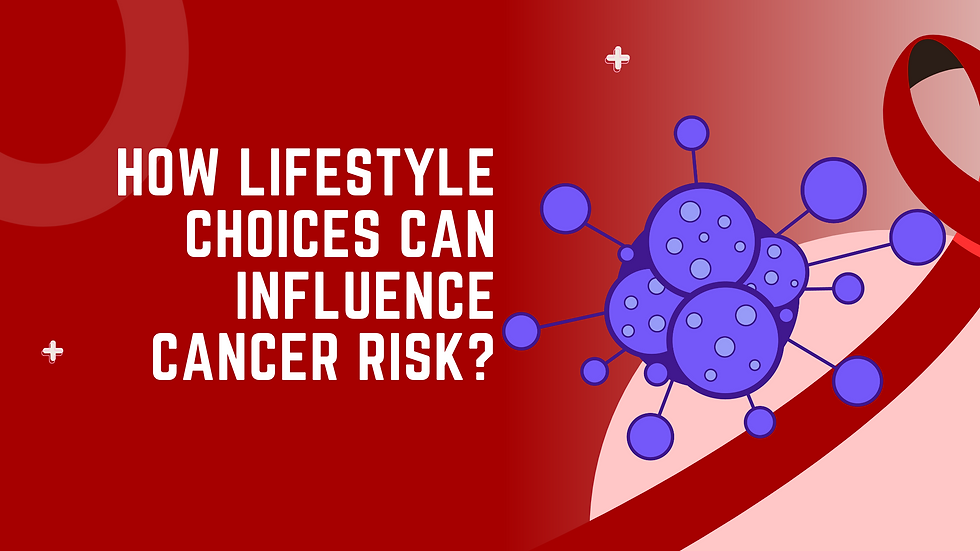5 Early Warning Signs of Oral Cancer You Should Not Ignore
- Dr H K Barman

- Jul 15, 2025
- 3 min read

Oral cancer ranks as one of the most lethal forms of cancer if not identified in time. It starts subtly, with mild symptoms that are easily overlooked or underestimated. However, placing such warning signs can be the difference between a successful treatment and a failed one.
As an oncologist based in Guwahati, I have cared for several patients suffering from oral cancers and cancers of the head and neck.
They had come late in the disease stage, only because they had not identified the warning signs. In this blog, I will guide you through the five early signs of oral cancer you should never ignore, and what to do if you notice them.
1. Sores in the Mouth That Do Not Heal
The most frequently observed early sign of oral cancer is a sore, ulcer, or lesion located in the mouth, on the tongue, gums, inner cheeks, or the roof of the mouth that fails to heal within a two-week period. These sores may or may not cause pain, leading many individuals to overlook them.
In contrast to standard mouth ulcers that typically resolve with standard treatment or medication, cancerous ulcers may bleed, increase in size, or harden over time. If the sore remains unhealed or appears unusual, it is essential to seek evaluation.
Dr. Himajit's Suggestion:
If any mouth sore lasts more than 14 days, especially with no visible damage or irritation, have it checked out. A rapid biopsy may rule out something serious.
2. Red or White Spots (Leukoplakia/Erythroplakia)
Another important early warning is the development of whitish (leukoplakia), reddish (erythroplakia), or mixed-colored spots in the mouth. They are the result of abnormal cell growth and are usually precancerous.
They are most common on the inner cheek, tongue, or gum. They may be slightly raised, rough, or rub off. They are usually painless but persistent.
Although not all leukoplakia or erythroplakia become cancerous, the presence of them means that your oral tissues are being subjected to abnormal stress, most commonly from tobacco, alcohol, or poor oral hygiene.
3. Difficulty in swallowing or feeling like something is stuck in the throat at all times
Trouble swallowing food, liquids, or even saliva for an extended period of time may be a sign of a tumor growing in the oropharynx, the area closer toward the back of the mouth that has the tonsils and the throat. Some people say it feels like "something is stuck in the throat" and cannot be cleared.
This symptom is often accompanied by hoarseness, a change in voice, or throat pain. These are signs that the growth is likely to be compressing the throat or vocal cords.
Tip: If you're constantly grabbing for water to swallow medicine or pills, or swallowing is painful, have it checked out. Don't blame it on a sore throat or acidity.
4. Unanticipated bleeding or numbness of the face or mouth
If your bleeding gums, tongue, or cheek is not due to brushing too hard or biting your tongue or cheek, it may be more than a dental issue. Similarly, if your tongue, lip, or cheek is numb or tingling without trauma, this may be a sign of nerve involvement.
These are signs that cancer is likely to be affecting the blood vessels or nerves in the affected organ, especially if they are recurring or ongoing despite treatment.
5. A Mass, Lump, or Thickening in the Jaw, Neck, or Mouth
Having a mass or hard swelling in the mouth, in the jaw, or on the neck, particularly one that grows, can be lymph node or tumor involvement. The lumps are initially painless, and for that reason, most patients are not concerned or even aware.
Cancer may even metastasize to the lymph nodes early on, especially in the neck and head. Infections not getting better on antibiotics or lasting over a few weeks need to be investigated.
Tip: Look regularly down your jawline and neck in the mirror, particularly if you are a smoker, chew tobacco, or have frequent alcohol use.
Why Early Detection Matters
If oral cancer is detected early, the survival prognosis is great, with less destructive surgery, reduced side effects, and a higher quality of life after recovery. The problem is that most people wait too long to visit their doctor, assuming the symptom is harmless or inconsequential.
As a practitioner, I emphasize screening for oral cancer, particularly in those patients older than 40 years old or any individual with risk factors such as the use of tobacco, alcohol, poor oral hygiene, or a family history of cancer.
Take Action, Book Your Screening Today
If you experience any of these symptoms or are in doubt, don't wait.
A quick check-up will reassure you or lead to early treatment if required.
_edited.png)
.png)



Comments